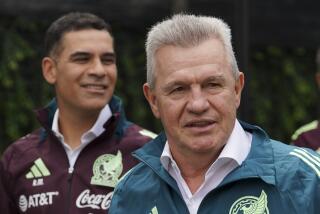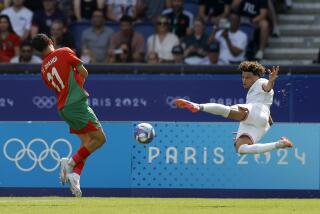World Cup Mexico 86 : Another Big Task Awaits Morocco : African Team, Coached by Brazilian, Faces West Germany
- Share via
PUEBLA, Mexico — Out of Africa comes a tale so improbable that it has to be true.
Its characters include a soccer-mad monarch, his princely sons, and a feisty Brazilian coach.
Its locations take it from the exotic to the remote, from Casablanca to Cairo, from Benghazi to Lilongwe.
Its story-line is as old as time. It is the tale of David and Goliath, of Jack and the giant.
Welcome to the impossible dream come true. Welcome to Morocco’s 1986 World Cup challenge.
Today in Monterrey, another desert city thousands of miles and entire cultures removed from Rabat or Casablanca, Morocco will play West Germany in the second round of the World Cup.
In all likelihood, the Moroccans will be beaten, possibly soundly, but there is a vast difference between defeat and failure. Morocco may lose today, but its showing in this tournament has been an overwhelming success.
No African nation has ever gone this far before. Many have tried; Egypt, for example, and Algeria, Cameroun, Zaire, Tunisia and even Morocco itself. None has ever made it past the first round. Until now.
On his team’s arrival in Mexico in early May, Jose Faria, a jovial, 52-year-old who left Rio de Janeiro to seek fame and fortune in North Africa, said it would be a tremendous achievement if his players survived their first three games.
The World Cup draw had not been kind to Morocco, putting it in the same group as European powers Poland, England and Portugal. A third-place finish would have been the most that could have been expected.
Morocco finished first.
The decisive result was a 3-1 victory over Portugal in Guadalajara last Wednesday. It was Morocco’s first win in the World Cup, its previous five matches in 1970 and this year having resulted in three ties and two losses.
Faria called it a historic win, and he was not far wrong.
“Never in the history of world soccer has a Third World or African team come first in its group . . . and this was a strong group,” he said. “Lots of people expected us to lose and lots of people lost on the lottery.
“We could go home now. It’s as if we’ve won the world championship already.”
Well, not quite, but Morocco’s accomplishment in holding both Poland and England to scoreless ties and then thrashing the Portuguese will certainly cause some pause among the West Germans this afternoon. They will not be able to take the game lightly, and in the back of their minds will be the memory that they had to come from behind to beat Morocco in Leon during the 1970 World Cup, 2-1.
For Morocco, the road to Monterrey started two years ago in Freetown, Sierra Leone, where, on June 30, 1984, it scored a 1-0 win over Sierra Leone.
Over the next 12 months, the Moroccans went on to knock Sierra Leone, Malawi, Egypt and Libya out of the competition. All four home games against those countries resulted in victories, each by a shutout.
Of course, the Moroccan players did have some motivation when they played in either Rabat or Casablanca. King Hassan II is an avid fan, and his two sons, Crown Prince Sidi Mohamed and Prince Monlay Raschid, spent the home games on the Morocco bench.
The treatment was less royal on the road, but the results were no less successful. Faria’s squad held Malawi and Egypt to scoreless ties in Lilongwe and Cairo, respectively, before losing to the Libyans in Benghazi, 1-0.
That final qualifying-game loss was not enough to push Morocco off the World Cup path, and it joined Algeria as one of Africa’s two representatives in the tournament here.
The players West Germany will have to beware of this afternoon include Morocco’s goalkeeping captain, Ezaki Badou, and its playmaking midfielder, Mohammed Timmoumi.
Badou is almost an institution in Morocco, having saved his country from defeat on countless occasions since he became the starting goalkeeper in 1979. His inspirational play, combined with his ability to organize the defense, proved invaluable during the qualifying rounds and even more so in the last two weeks.
Timmoumi, a year younger than Badou at 26, is the key to Morocco’s hopes. His vision of the game, his ball control and his amazing acceleration make him a difficult opponent to contain. The victim of a clumsy tackle in November, he has not quite been at his best in Mexico because of the injury.
Even so, Morocco has other guns in its arsenal, players such as Mustapha El Hadaoui, Adbelaziz Bouderbala and the player whose two goals sank Portugal, Abderrazak Khairi.
If the players need further inspiration today, which is unlikely, they can think back to what their spokesman, Mohamed Ibno Nosair, said when they first arrived in Mexico.
“The Moroccan team comes ready to win,” he said. “Our chances of triumphing cannot be discounted because anything is possible in soccer.”
In 1986, Morocco has once again proven that true.
More to Read
Go beyond the scoreboard
Get the latest on L.A.'s teams in the daily Sports Report newsletter.
You may occasionally receive promotional content from the Los Angeles Times.







